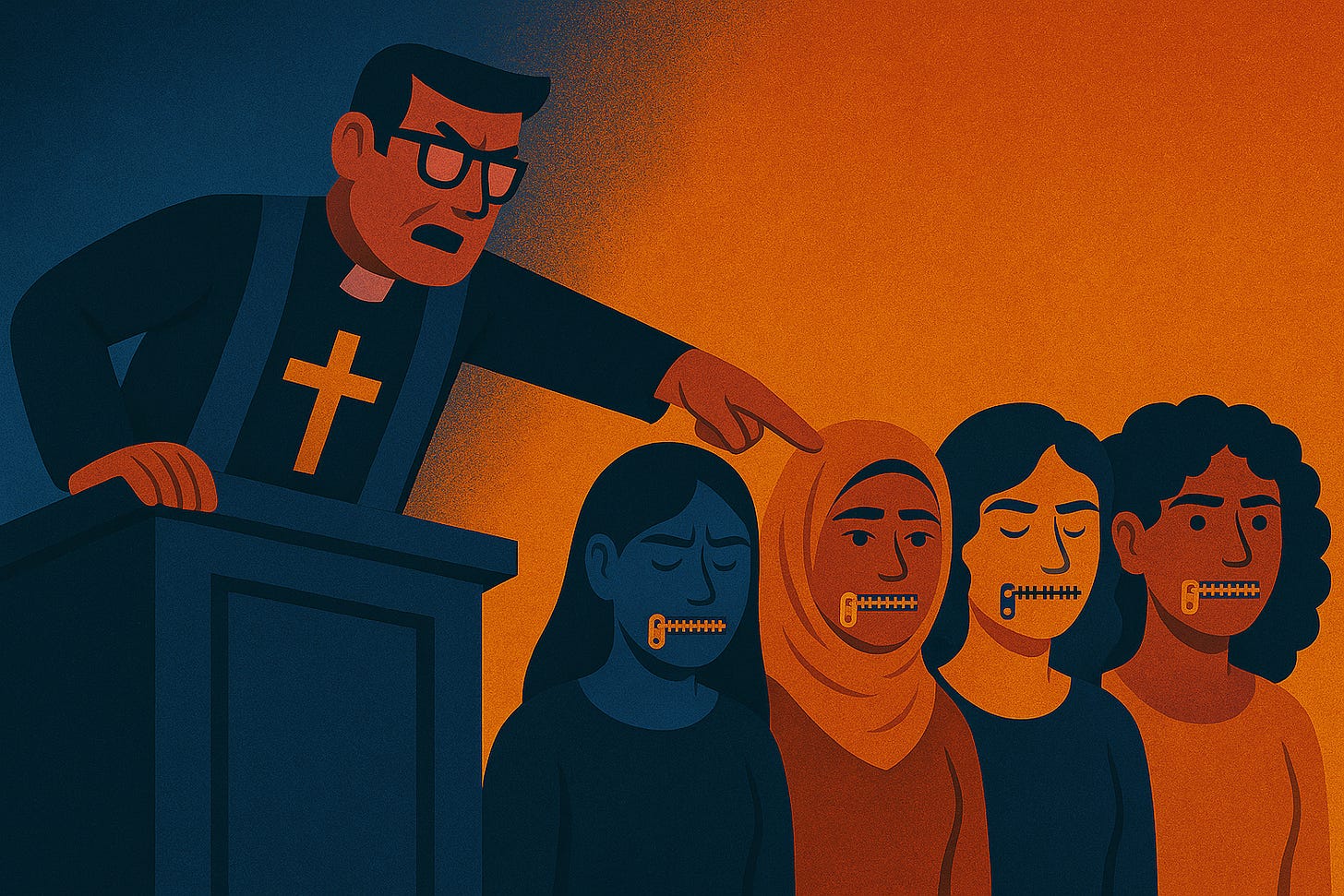If Religion Came from Above, Why Has It Always Looked Like the Men Below?
How Patriarchy Disguised Itself as Divine Will
You’re reading a free post from Reasoned Reality, where I dissect religious dogma and challenge faith-based narratives with facts, reason, and a sharp edge.
If you value this work and want to help it grow, please consider becoming a paid subscriber for just $6.66/month. Your support helps fund future deep-dive essays, video documentaries, and public challenges to Christian nationalism.
Truth doesn’t fear scrutiny. It invites it.
Every major religion claims to speak for God. But strangely, none of them speak from women.
The God is male.
The prophets are male.
The rules were written by men, enforced by men, and—more often than not—used to control women.
This pattern isn’t accidental. It's systemic.
Religious texts weren’t born in a vacuum. They were shaped in patriarchal cultures, curated by male scribes, and interpreted by male leaders. And for thousands of years, those men claimed divine authority to enforce very earthly power structures.
The Divine Masculine—And the Convenient Erasure of Women
In nearly every dominant religion, God is imagined as a “Father,” a “King,” a “Lord.” His chosen messengers are always men. His commands reinforce male authority, female submission, and rigid gender roles.
Where is the divine feminine?
Where are the female messiahs, lawmakers, and scribes?
The answer isn’t that women weren’t spiritual or wise. It’s that their voices weren’t preserved. Or worse—they were erased.
Take Asherah, the ancient Canaanite goddess who the majority of scholars believe was once worshipped alongside Yahweh. Over time, she was scrubbed from the Hebrew tradition. Not because her presence threatened theological coherence—but because she threatened male dominance.
This isn’t just about myth. It’s about method. Male-centered theology becomes male-centered morality. And once the moral structure is rigged, everything built on top of it—laws, roles, punishments—serves the interests of the powerful.
Programmed Submission Disguised as Holiness
Many believers don’t question these hierarchies because they’ve been taught to see them as sacred. Patriarchy is not called power—it’s called “God’s order.” Obedience isn’t seen as forced—it’s framed as righteousness.
But this only works if you never ask why God looks exactly like the men in charge.
It’s a brilliant tactic:
Wrap man-made systems in divine authority, and suddenly, disagreement isn’t just rebellion—it’s heresy.
Challenge oppression, and you’re not just defiant—you’re damned.
If Truth Is Divine, It Shouldn’t Be Gendered
The most damning evidence against divine authorship may be how clearly religion reflects human bias.
If a religion were truly from a higher plane, wouldn’t it transcend the cultural norms of Iron Age tribes? Wouldn’t it elevate those who were marginalized, not reinforce their marginalization? Wouldn’t it affirm human dignity, regardless of gender?
Instead, we get holy texts that codify women as property, silence their voices, and grant divine cover to systems of inequality.
That doesn’t sound like a divine revelation.
That sounds like ancient patriarchy—dressed up in robes and rituals.
A Better Standard for Morality
If truth is truly universal, it shouldn’t be gendered.
And if morality is truly divine, it shouldn’t exclude half the species.
That’s why I don’t find religion convincing. Not because I want to sin. Not because I’m angry. But because I’ve seen how power disguises itself as holiness—and how effective that disguise has been for centuries.
The more you look, the clearer it becomes:
Religion didn’t fall from the heavens. It rose from the ground—crafted by human hands, shaped by male power, and passed off as sacred to keep people in line.
And once you see that, there’s no going back.
This space is for all of us who were handed fear and called it faith. Who were taught to sacrifice ourselves for the comfort of others. Who are finally learning to take it all back.
Thank you for reading Reasoned Reality. If this resonated with you, consider becoming a subscriber to support future stories like this.
👉 $6.66/month. Because truth doesn’t fear scrutiny. It invites it.



